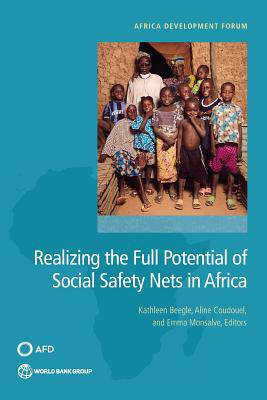
- Afhalen na 1 uur in een winkel met voorraad
- Gratis thuislevering in België vanaf € 30
- Ruim aanbod met 7 miljoen producten
- Afhalen na 1 uur in een winkel met voorraad
- Gratis thuislevering in België vanaf € 30
- Ruim aanbod met 7 miljoen producten
Realizing the Full Potential of Social Safety Nets in Africa
public spending priorities for African agriculture productivity growth
World BankOmschrijving
Poverty remains a pervasive and complex phenomenon in Sub-Saharan Africa. Part of the agenda in recent years to tackle poverty in Africa has been the launching of social safety nets programs. All countries have now deployed safety net interventions as part of their core development programs. The number of programs has skyrocketed since the mid-2000s though many programs remain limited in size. This shift in social policy reflects the progressive evolution in the understanding of the role that social safety nets can play in the fight against poverty and vulnerability, and more generally in the human capital and growth agenda. Evidence on their impacts on equity, resilience, and opportunity is growing, and makes a foundational case for investments in safety nets as a major component of national development plans. For this potential to be realized, however, safety net programs need to be significantly scaled-up. Such scaling up will involve a series of technical considerations to identify the parameters, tools, and processes that can deliver maximum benefits to the poor and vulnerable. However, in addition to technical considerations, and at least as importantly, this report argues that a series of decisive shifts need to occur in three other critical spheres: political, institutional, and fiscal. This report highlights the implications which political, institutional, and fiscal aspects have for the choice and design of programs. Fundamentally, it argues that these considerations are critical to ensure the successful scaling-up of social safety nets in Africa, and that ignoring them could lead to technically-sound, but practically impossible, choices and designs.
Specificaties
Betrokkenen
- Auteur(s):
- Uitgeverij:
Inhoud
- Aantal bladzijden:
- 418
- Taal:
- Engels
- Reeks:
Eigenschappen
- Productcode (EAN):
- 9781464811647
- Verschijningsdatum:
- 2/08/2018
- Uitvoering:
- Paperback
- Formaat:
- Trade paperback (VS)
- Afmetingen:
- 152 mm x 229 mm
- Gewicht:
- 698 g

Alleen bij Standaard Boekhandel
Beoordelingen
We publiceren alleen reviews die voldoen aan de voorwaarden voor reviews. Bekijk onze voorwaarden voor reviews.











